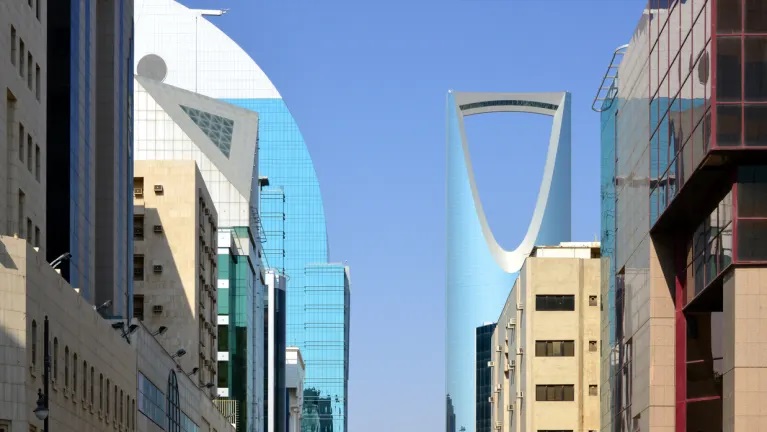[This article has been corrected.]
Development in Saudi Arabia continues to accelerate with projects like the NEOM business development region and the strategic framework Vision 2030, and there is an increasing need for skilled short-term workers in the kingdom. Recognizing this need, Saudi Arabia has launched a new Temporary Work Visa designed to streamline and expedite the process of bringing short-term workers into the country, while also broadening which types of workers are eligible for the visa.
This is a change from the previously available visa, the Work Visit Visa. "The previous one used to be restricted, usually, to technical work, and certain designations, like engineering … were used a lot in the oil industry in the eastern province for people who worked on and off rotation. But this new one is basically available pretty much to all," said Sara Khoja, an attorney with Clyde & Co in Dubai, United Arab Emirates. "It's still designed for short-term professional projects in the kingdom, to resource those kinds of temporary projects, but it is available to a much wider range of individuals than the previous ones."
"Older working visas have been largely restricted to male workers or older female workers, usually above 40," said Heinrich Köllisch, legal consultant at Schlüter Graf in Dubai. "The invitation procedures are much easier right now."
Why Now?
The Vision 2030 framework has encouraged many new projects throughout the country, accelerating a trend that makes it important to bring more workers in.
"There's just a whole array of visas that have become available in the last two years," Khoja said. "The level of resourcing that projects like NEOM need, it's really high. So having these kinds of temporary visas helps."
"Saudi Arabia is undergoing many overall developments in light of their Vision 2030, so facilitating doing business and enabling the private sector to run and conduct and manage its business in the most efficient and facilitated ways is one of the main objectives," said Sara Aalamri, an attorney with AlGhazzawi & Partners in Jeddah, Saudi Arabia. "The labor law in Saudi Arabia also accommodates temporary work employment contracts, so this would seem suitable and to fit."
Beyond Vision 2030, this new visa is part of a larger push to make Saudi Arabia available to foreign workers. "It goes hand in hand with other measures of opening up the country, of the transformation of the economy from a more closed-off oil-based economy toward an economic powerhouse in the region, where Saudi Arabia should be an attractive place for foreign direct investments," Köllisch said.
How Does It Work?
Compared with the previous visa, the Temporary Work Visa is much easier for foreign workers to acquire. "You need someone in Saudi Arabia who actually invites you; they will be sponsoring the visa," Köllisch said. "So that entity should have a commercial register within Saudi Arabia, that must be a Saudi commercial or Saudi entity, either a single merchant in Saudi Arabia, a branch of a company or an independent company itself; it should be distinct."
"It's not something that an individual could apply for or obtain by themselves," Khoja said. "It has to [come from] a Saudi company, well-established, registered with all the relevant authorities, registered with the Ministry of HR. And it would apply through an electronic platform for this business of bringing an individual in on a temporary basis."
The temporary professional visa is valid for three months upon entry into Saudi Arabia and must be used within one year of being issued. Permanent professional visas last, by contrast, two years. The temporary professional visa can be extended while the worker is in Saudi Arabia, to last for a subsequent three months. There is no requirement to leave the country in order to renew the visa. The official QIWA website, which provides services and solutions to the Saudi Arabia Ministry of Human Resources and Social Development, supplies updated information on the visas.
What Are the Benefits?
The ease of acquiring the temporary visa is one of its many benefits to both workers and companies. "The ability to bring people in quickly and with flexible resourcing [is beneficial], because with some of the projects, you don't want to necessarily have people on the ground all the time, especially as some of the projects are in remote areas," Khoja said.
"It basically enables many more people to work in Saudi Arabia on projects more easily. Entities in Saudi Arabia can support their labor force inside with specialists as needed on a much swifter approach than before, so less administration, more flexible, more speeded up processes on projects inside Saudi Arabia," Köllisch said.
The temporary visa gives workers an opportunity to test the waters of working in the country before they commit to a more long-term contract. The speed and flexibility are the main benefits for everyone involved, from Saudi Arabia itself to the employees acquiring the visa.
It's likely that more specialized work visas will come in the future. "It's the beginning of a trend," Khoja said.
Katie Nadworny is a freelance writer in Istanbul.
An organization run by AI is not a futuristic concept. Such technology is already a part of many workplaces and will continue to shape the labor market and HR. Here's how employers and employees can successfully manage generative AI and other AI-powered systems.




